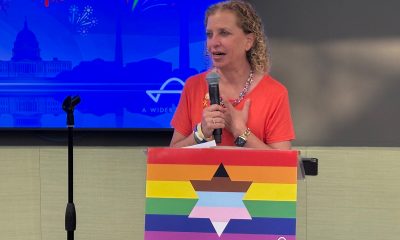World
Global Pride events to renew demands for equality
Kyiv Pride to take place in Liverpool
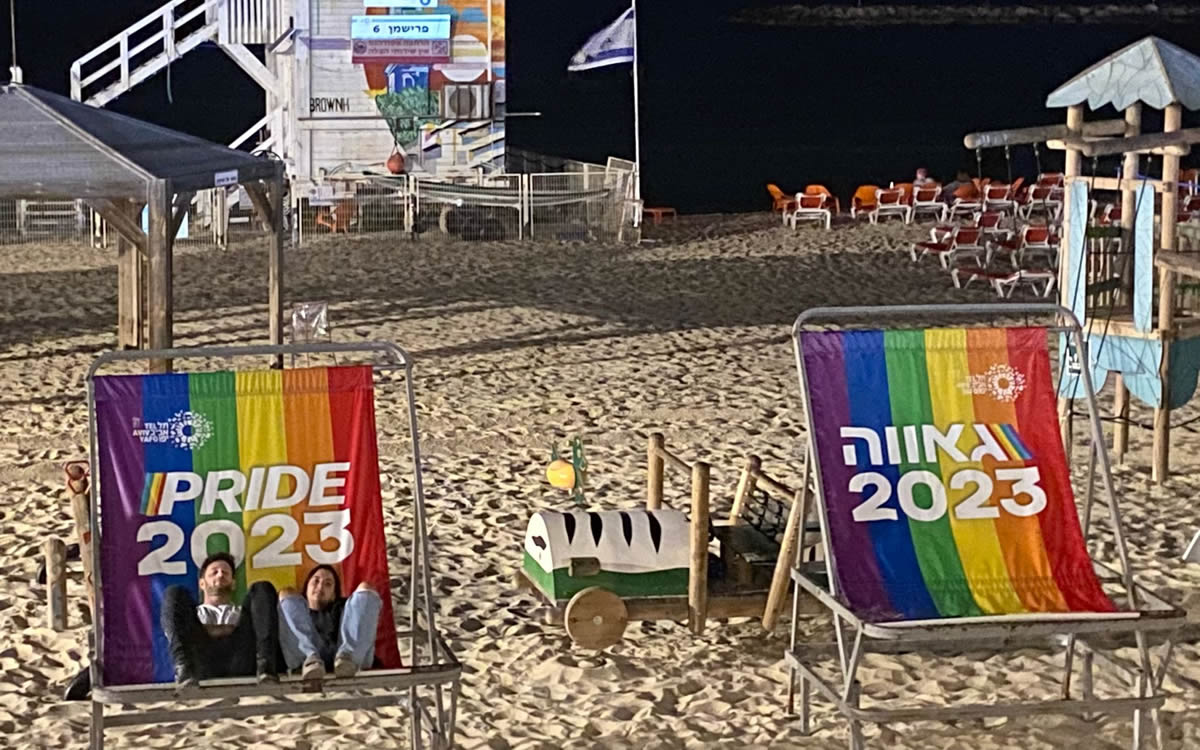
Activists around the world are using Pride events to renew their demands for full equality.
This year’s Pride month coincides with the debate over marriage equality in Aruba.
The Joint Court of Justice of Aruba, Curaçao, Sint Maarten and of Bonaire, Sint Eustatius and Saba that has jurisdiction over three constituent countries (Aruba, Curaçao and Sint Maarten) and three special municipalities (Bonaire, Sint Eustatius and Saba) within the Netherlands late last year ruled Aruba and Curaçao must extend marriage rights to same-sex couples.
Gay Aruban Sen. Miguel Mansur on Wednesday told the Washington Blade that he and activists on the island are “pushing to have” the marriage equality debate this month, but opponents in the Aruban Parliament have been trying to delay. Mansur further stressed this year’s Pride month events are an important way to counter those who oppose marriage equality and other LGBTQ rights.
“It’s especially important for representation because of the same-sex marriage law there was an onslaught of attacks by certain religious groups, an association of churches,” said Mansur. “Representation and visibility are more important than ever.”
Upwards of 30,000 people participated in the Jerusalem Pride and Tolerance Parade on June 2. Former Israeli Prime Minister Yair Lapid, who now leads the country’s opposition, is among those who sharply criticized members of the current government over their opposition to LGBTQ rights.
“Outside are standing, like every year, the wretched thugs of Lahava movement, demonstrating against us,” said Lapid. “Only this year these people are no longer just a ridiculous bunch of dark extremists — they are part of the government. Bezalel Smotrich, (Internal Security Minister) Itamar Ben-Gvir [and] Avi Maoz, are trying to push us all back into the closet, to the dark closet of their foreknowledge.
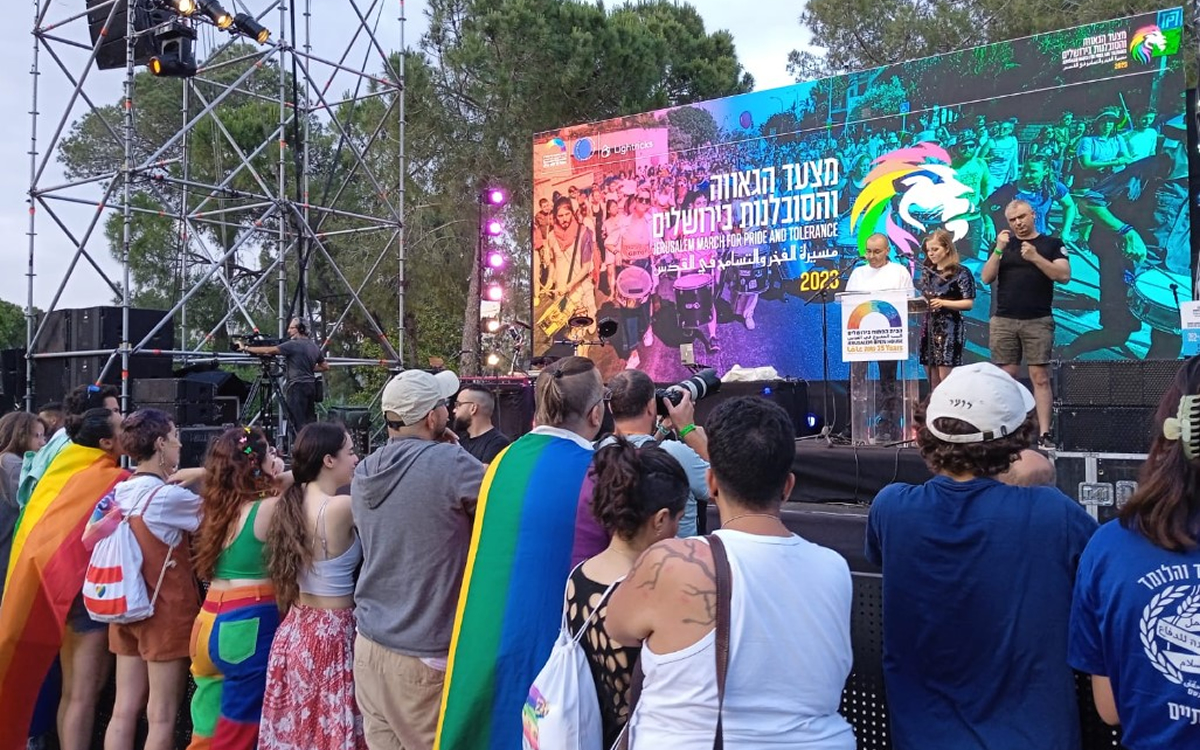
Thai MP Pita Limjaroenrat, who is the frontrunner to become the country’s next prime minister, is among those who participated in Bangkok’s Pride parade that took place on June 4. Limjaroenrat told reporters that his government will support marriage equality and a transgender rights law once it forms.
“Love is love and love must win,” said Limjaroenrat in a Facebook post.
Hundreds of people on June 4 participated in a Pride march in the Sri Lankan capital of Colombo.
Rosanna Flamer-Caldera, executive director of Equal Ground, a Sri Lankan advocacy group, on Wednesday noted to the Blade that her organization will hold a queer film festival and other events throughout Pride month. Activists in Jaffna, a city in northern Sri Lanka, are also planning to hold a Pride march.
These events will take place roughly four months after the Sri Lankan government announced it supports a bill that would decriminalize consensual same-sex sexual relations in the country.
“We are really proud of the work that we have done around bringing Pride to Sri Lanka,” said Flamer-Caldera. “It was an alien concept 19 years ago when we first started. We have started a movement in Sri Lanka around Pride.”

São Paulo’s annual Pride parade, which is among the world’s biggest, will take place on the city’s Paulista Avenue on June 11.
São Paulo LGBT+ Parade Vice President Renato Viterbo notes participants and organizers seek to “draw the attention of government officials to what public policies should be for all citizens, regardless of their sexual orientation.” The Movement for Homosexual Integration and Liberation, the Chilean advocacy that organizes the annual Pride parade in Santiago, the country’s capital, says it plans to use the June 24 event as a way to demand President Gabriel Boric’s government to strengthen the country’s anti-discrimination law and to create what it describes as “an anti-discrimination institutionality.”
Ugandan President Yoweri Museveni on May 29 signed his country’s Anti-Homosexuality Act with a death penalty provision for “aggravated homosexuality.” This year’s Pride events are also taking place against the backdrop of the war in Ukraine.
Anna Sharyhina, co-founder of the Sphere Women’s Association, a group that promotes LGBTQ and intersex rights in Ukraine, last September led a Pride march in a subway station in Kharkiv, the country’s second-largest city that is less than 30 miles from the Russian border in eastern Ukraine.
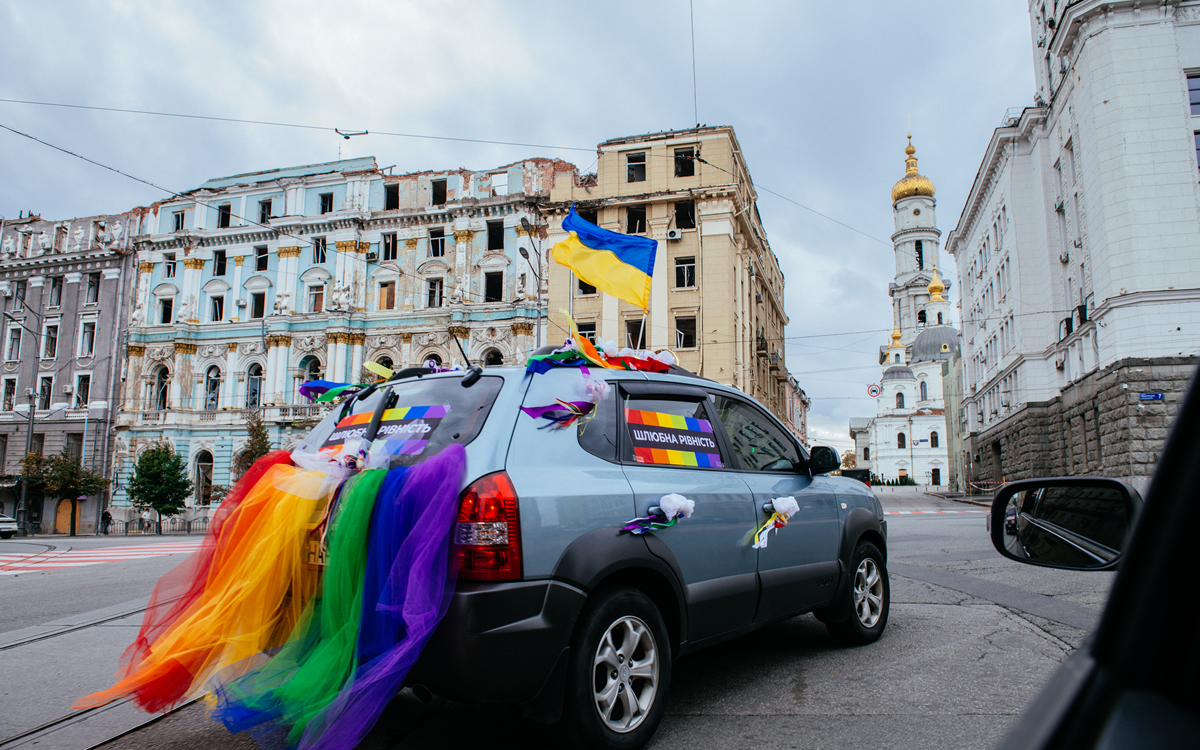
The Liverpool City Region Pride Foundation and Kyiv Pride on July 29 will hold a joint Pride event in the English city of Liverpool.
“Liverpool and Ukraine remain united by love,” tweeted Pride in Liverpool on June 1. “This year Liverpool will showcase Kyiv and Ukraine’s LGBT+ spirit as our annual March with Pride is held jointly with Kyiv Pride.”
Liverpool and Ukraine remain united by love 💙💛
‼ Some BIG NEWS today and we’re going to Shout It Loud ‼ This year Liverpool will showcase Kyiv and Ukraine’s LGBT+ spirit as our annual March with Pride is held jointly with @KyivPride. 🇺🇦 🏳️🌈 🏳️⚧️❤️ pic.twitter.com/YbEVuTKKVy
— Pride In Liverpool (@PrideInLpool) June 1, 2023
The Baltic Pride March will take place in the Estonian capital of Tallinn on June 10. Reykjavík Pride will take place in the Icelandic capital from Aug. 8-13.
The importance of Reykjavík Pride is tremendous, and has always been tremendous, for both the queer community and the society around us. This is where we come together, fight for acceptance and celebrate our successes,” Reykjavík Pride Managing Director Inga Auðbjörg K. Straumland told the Blade. “However, the backlash is hitting us, like it’s hitting our siblings across the globe. We feel that the rights of our community are sliding backwards and we acknowledge that the fight is far from over.”
“This year it’s therefore very important that we come together, ready to continue to fight for our rights; especially for the rights of those that are most marginalized within our community,” added Straumland. “We do that by uniting. By talking, dancing, shouting, demanding, singing and painting the whole city in rainbow colors; showing the rest of the world that we’re going nowhere.”
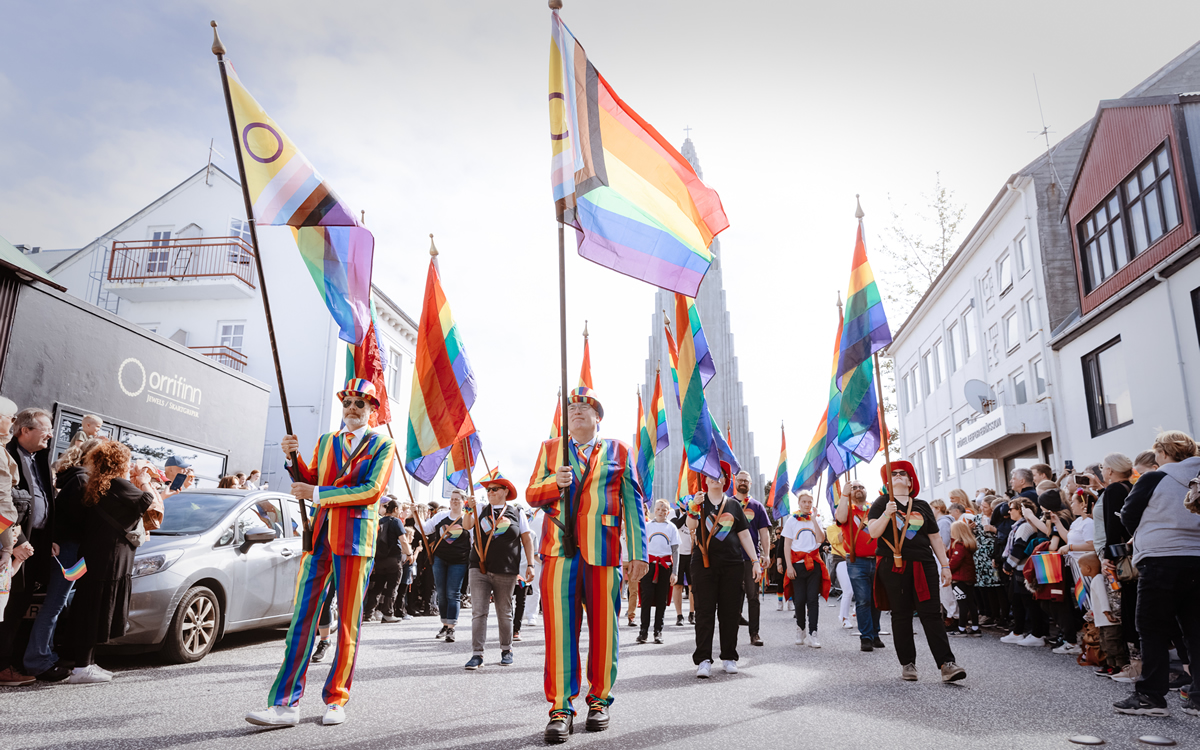
Brody Levesque and WDG, the Blade’s media partner in Israel, contributed to this story.
Venezuela
AHF client in Venezuela welcomes Maduro’s ouster
‘This is truly something we’ve been waiting for’ for decades

An AIDS Healthcare Foundation client who lives in Venezuela told the Washington Blade he welcomes the ouster of his country’s former president.
The client, who asked the Blade to remain anonymous, on Thursday said he felt “joy” when he heard the news that American forces seized Nicolás Maduro and his wife, Cilia Flores, at their home in Caracas, the Venezuelan capital, during an overnight operation on Jan. 3.
“This is truly something we’ve been waiting for for 26 or 27 years,” the AHF client told the Blade.
Hugo Chávez became Venezuela’s president in 1999. Maduro succeeded him in 2013 after he died.
“I’ve always been in opposition,” said the AHF client, who stressed he was speaking to the Blade in his personal capacity and not as an AHF representative. “I’ve never agreed with the government. When I heard the news, well, you can imagine.”
He added he has “high hopes that this country will truly change, which is what it needed.”
“This means getting rid of this regime, so that American and foreign companies can invest here and Venezuela can become what it used to be, the Venezuela of the past,” he said.
The AHF client lives near the Colombia-Venezuela border. He is among the hundreds of Venezuelans who receive care at AHF’s clinic in Cúcuta, a Colombian city near the Táchira River that marks the border between the two countries.
The Simón Bolívar Bridge on the Colombia-Venezuela border on May 14, 2019. (Washington Blade video by Michael K. Lavers)
The AHF client praised U.S. President Donald Trump and reiterated his support for the Jan. 3 operation.
“It was the only way that they could go,” he said.
The Venezuelan National Assembly on Jan. 4 swore in Delcy Rodríguez, who was Maduro’s vice president, as the country’s acting president. The AHF client with whom the Blade spoke said he is “very optimistic” about Venezuela’s future, even though the regime remains in power.
“With Maduro leaving, the regime has a certain air about it,” he said. “I think this will be a huge improvement for everyone.”
“We’re watching,” he added. “The actions that the United States government is going to implement regarding Venezuela give us hope that things will change.”
Colombia
Colombians protest against Trump after he threatened country’s president
Tens of thousands protested the US president in Bogotá

BOGOTÁ, Colombia — Tens of thousands of people on Wednesday gathered in the Colombian capital to protest against President Donald Trump after he threatened Colombian President Gustavo Petro.
The protesters who gathered in Plaza Bolívar in Bogotá held signs that read, among other things, “Yankees go home” and “Petro is not alone.” Petro is among those who spoke.
The Bogotá protest took place four days after American forces seized now former Venezuelan President Nicolás Maduro and his wife, Cilia Flores, at their home in Caracas, the Venezuelan capital, during an overnight operation.
The Venezuelan National Assembly on Sunday swore in Delcy Rodríguez, who was Maduro’s vice president, as the country’s acting president. Maduro and Flores on Monday pleaded not guilty to federal drug charges in New York.
Trump on Sunday suggested the U.S. will target Petro, a former Bogotá mayor and senator who was once a member of the M-19 guerrilla movement that disbanded in the 1990s. Claudia López, a former senator who would become the country’s first female and first lesbian president if she wins Colombia’s presidential election that will take place later this year, is among those who criticized Trump’s comments.
The Bogotá protest is among hundreds against Trump that took place across Colombia on Wednesday.
Petro on Wednesday night said he and Trump spoke on the phone. Trump in a Truth Social post confirmed he and his Colombian counterpart had spoken.
“It was a great honor to speak with the president of Colombia, Gustavo Petro, who called to explain the situation of drugs and other disagreements that we have had,” wrote Trump. “I appreciated his call and tone, and look forward to meeting him in the near future. Arrangements are being made between Secretary of State Marco Rubio and the foreign minister of Colombia. The meeting will take place in the White House in Washington, D.C.”
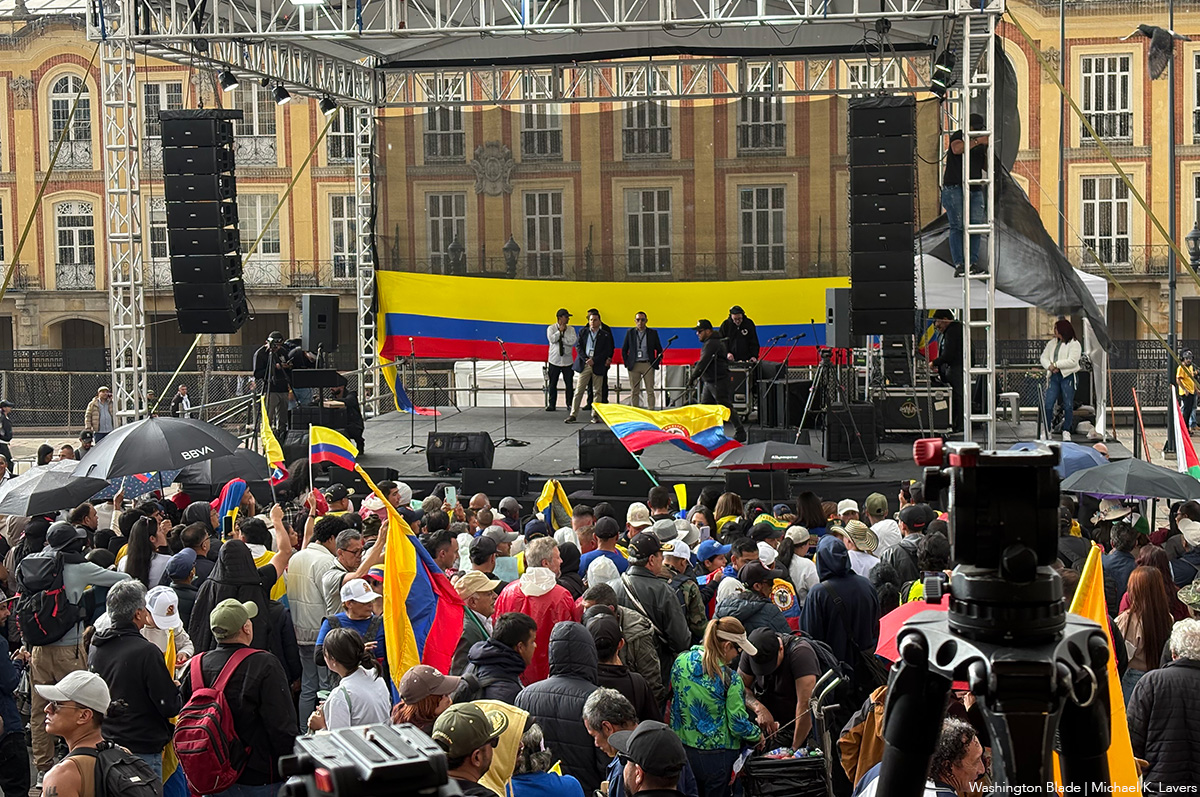
Colombia
Gay Venezuelan man who fled to Colombia uncertain about homeland’s future
Heberth Aguirre left Maracaibo in 2018

BOGOTÁ, Colombia — A gay Venezuelan man who has lived in Colombia since 2018 says he feels uncertain about his homeland’s future after the U.S. seized now former Venezuelan President Nicolás Maduro.
“On one hand I can feel happy, but on the other hand I feel very concerned,” Heberth Aguirre told the Washington Blade on Tuesday during an interview at a shopping mall in Bogotá, the Colombian capital.
Aguirre, 35, is from Maracaibo, Venezuela’s second-largest city that is the heart of the country’s oil industry.
He developed cultural and art initiatives for the Zulia State government.
“Little by little, I suddenly became involved in politics because, in a way, you had to be involved,” recalled Aguirre. “It was necessary to be involved because the regime often said so.”
“I basically felt like I was working for the citizens, but with this deeply ingrained rule we had to be on their side, on the side of the Maduro and (former President Hugo) Chávez regime,” he added.
Maduro in 2013 became Venezuela’s president after Chávez died.
“There are things I don’t support about the regime,” Aguirre told the Blade. “There are other things that were nice in theory, but it turned out that they didn’t work when we put them into practice.”
Aguirre noted the Maduro government implemented “a lot of laws.” He also said he and other LGBTQ Venezuelans didn’t “have any kind of guarantee for our lives in general.”
“That also exposed you in a way,” said Aguirre. “You felt somewhat protected by working with them (the government), but it wasn’t entirely true.”
Aguirre, 35, studied graphic design at the University of Zulia in Maracaibo. He said he eventually withdrew after soldiers, members of Venezuela’s Bolivarian National Guard, and police officers opened fire on students.
“That happened many times, to the point where I said I couldn’t keep risking my life,” Aguirre told the Blade. “It hurt me to see what was happening, and it hurt me to have lost my place at the university.”
Venezuela’s economic crisis and increased insecurity prompted Aguirre to leave the country in 2018. He entered Colombia at the Simón Bolívar Bridge near the city of Cúcuta in the country’s Norte de Santander Province.
“If you thought differently, they (the Venezuelan government) would come after you or make you disappear, and nobody would do anything about it,” said Aguirre in response to the Blade’s question about why he left Venezuela.
The Simón Bolívar Bridge on the Colombia-Venezuela border on May 14, 2019. (Washington Blade video by Michael K. Lavers)
Aguirre spoke with the Blade three days after American forces seized Maduro and his wife, Cilia Flores, at their home in Caracas, the Venezuelan capital, during an overnight operation.
The Venezuelan National Assembly on Sunday swore in Delcy Rodríguez, who was Maduro’s vice president, as the country’s acting president. Maduro and Flores on Monday pleaded not guilty to federal drug charges in New York.
President Donald Trump on Tuesday in a Truth Social post said Venezuela’s interim authorities “will be turning over between 30 and 50 million barrels of high quality, sanctioned oil, to the United States of America.”
“This oil will be sold at its market price, and that money will be controlled by me, as president of the United States of America, to ensure it is used to benefit the people of Venezuela and the United States,” wrote Trump.
Trump on Sunday suggested the U.S. will target Colombian President Gustavo Petro, a former Bogotá mayor and senator who was once a member of the M-19 guerrilla movement that disbanded in the 1990s.
Petro has urged Colombians to take to the streets on Wednesday and “defend national sovereignty.” Claudia López, a former senator who would become the country’s first female and first lesbian president if she wins Colombia’s presidential election that will take place later this year, is among those who criticized Trump’s comments.
“Let’s be clear: Trump doesn’t care about the humanitarian aspect,” said Aguirre when the Blade asked him about Trump. “We can’t portray him as Venezuela’s savior.”
Meanwhile, Aguirre said his relatives in Maracaibo remain afraid of what will happen in the wake of Maduro’s ouster.
“My family is honestly keeping quiet,” he said. “They don’t post anything online. They don’t go out to participate in marches or celebrations.”
“Imagine them being at the epicenter, in the eye of the hurricane,” added Aguirre. “They are right in the middle of all the problems, so it’s perfectly understandable that they don’t want to say anything.”
‘I never in my life thought I would have to emigrate’
Aguirre has built a new life in Bogotá.
He founded Mesa Distrital LGBTIQ+ de Jóvenes y Estudiantes, a group that works with migrants from Venezuela and other countries and internally placed Colombians, during the COVID-19 pandemic. Aguirre told the Blade he launched the group “with the need to contribute to the general population, not just in Colombia.”
Aguirre met his husband, an American from California, at a Bogotá church in December 2020 during a Christmas event that SDA Kinship Colombia, an LGBTQ group, organized. A Utah judge virtually officiated their wedding on July 12, 2024.
“I love Colombia, I love Bogotá,” said Aguirre. “I love everything I’ve experienced because I feel it has helped me grow.”
He once again stressed he does not know what a post-Maduro Venezuela will look like.
“As a Venezuelan, I experienced the wonders of that country,” said Aguirre. “I never in my life thought I would have to emigrate.”
The Colombian government’s Permiso por Protección Temporal program allows Aguirre and other Venezuelans who have sought refuge in Colombia to live in the country for up to 10 years. Aguirre reiterated his love for Colombia, but he told the Blade that he would like to return to Venezuela and help rebuild the country.
“I wish this would be over in five years, that we could return to our country, that we could go back and even return with more skills acquired abroad,” Aguirre told the Blade. “Many of us received training. Many of us studied a lot. We connected with organizations that formed networks, which enriched us as individuals and as professionals.”
“Returning would be wonderful,” he added. “What we’ve built abroad will almost certainly serve to enrich the country.”
-

 District of Columbia4 days ago
District of Columbia4 days agoTwo pioneering gay journalists to speak at Thursday event
-

 National3 days ago
National3 days agoWhat to watch for in 2026: midterms, Supreme Court, and more
-

 Colombia4 days ago
Colombia4 days agoBlade travels to Colombia after U.S. forces seize Maduro in Venezuela
-

 a&e features4 days ago
a&e features4 days agoQueer highlights of the 2026 Critics Choice Awards: Aunt Gladys, that ‘Heated Rivalry’ shoutout and more





